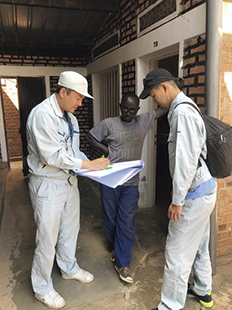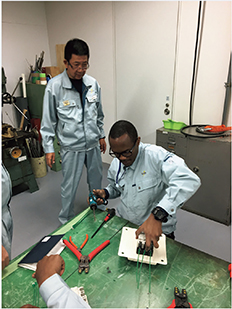Stories from the Field 01
An ABE Initiative Graduate Connecting Rwanda to a Japanese Company’s Lightning Protection Technology

Discussion with local cooperating staff about lightning protection solutions at a clinic (Photo: Otowa Electric Co., Ltd.)

Mr. Amiri (on the right) learning about Japanese technology as an intern at the company’s headquarters in Hyogo Prefecture (Photo: Otowa Electric Co., Ltd.)
Rwanda, a landlocked country in East Africa, experiences many lightning strikes. Out of a population of about 13 million people, nearly 100 people are killed or injured each year, and electrical and communication infrastructure and equipment failures occur frequently, due to lightning strikes. Thus, lightning protection is one of the urgent issues for Rwanda, which focuses on science and technology education, including ICT, and promotes the ICT industry.
Otowa Electric Co., Ltd, headquartered in Hyogo Prefecture, operates businesses specializing in lightning protection solutions, including the development, manufacturing, and sale of lightning arresters and devices, as well as lightning countermeasure consulting, both in Japan and overseas. The company accepted trainees from Rwanda, who were studying at Kobe Institute of Computing, as interns under the ABE Initiative (African Business Education Initiative for Youth).Note 1 This led them to learn about lightning damage in Rwanda and start considering whether their technology could be utilized there.
Looking back on the situation at the time, Vice President Mr. YOSHIDA Atsushi says, “I heard from one of the trainees, Mr. Mugarura Amiri, about the situation of lightning damage in Rwanda, and together we began conducting field research. As a result, we found that there were lightning protection products made overseas available locally, but that sufficient countermeasures were not taken. Also, standardization for lightning protection solutions, which are usually based on international standards, had not been developed.”
In 2016, Otowa Electric worked with local engineers in Rwanda on lightning protection solutions at Tumba College of Technology, a local engineer training school that Japan has supported for a long time, and provided the Rwanda Utilities Regulatory Authority (RURA) with the know-how to protect equipment from lightning through the proper installation and management of lightning arresters. After Otowa Electric conducted its own field research, the company applied for the SDGs Business Supporting Survey.Note 2 The reason was that the company considered the cooperation of JICA, with its local information and networks, essential in order to continue carrying out research, consultations, and construction on lightning protection solutions in Rwanda as a business, and to spread the countermeasures. Following the acceptance of the SDGs Business Model Formulation Survey with the Private Sector in 2017, the “SDGs Business Verification Survey with the Private Sector for Lightening Protection Solution on Key Infrastructure of the ICT Industry in Rwanda” was approved in 2019. The company also set up an Africa business office within the company and works on lightning protection solutions in Rwanda. Local cooperating staff acquire skills and knowledge in Japan and receive training in areas such as lightning arrester installation, maintenance, and consulting. At the same time, staff of Otowa Electric visit Rwanda from Japan two to three times a year for approximately one month to support local staff in conducting field research and construction work. Mr. Amiri, the first intern who inspired Otowa Electric to launch this project and who currently runs his own software company after returning to Rwanda, plays a central role as a partner of Otowa Electric’s local activities through technical consulting services for lightning protection. Director Mr. YOSHIDA Syutaro, who is in charge of overseas business, explains, “When officials from RURA visited Japan, we gave them an in-house tour so they could actually see our technology and lightning protection solutions. Once they understood that lightning damage could be prevented through advanced technology, the Government of Rwanda began to promote enhanced countermeasures on its own.”
Vice President Yoshida also feels the need for education on the mechanism of lightning and on how to protect oneself from lightning strikes. Otowa Electric, in cooperation with Kyoto University and with the help of some Japanese elementary school students, devised “Kaminari Onigokko (Lightning Tag),” a game through which you can learn evacuation behavior while playing, and promotes lightning protection education to children in Rwanda with Mr. Amiri’s assistance. Vice President Yoshida expresses his hopes that, “Even if you introduce good technology, its true value will not be demonstrated unless people understand its necessity. By educating children about lightning protection, we would like them to create a future in which people can take appropriate actions to prevent damage by lightning.”
Regarding future prospects, Director Yoshida says, “My top priority is to increase the number of people who understand the importance of lightning protection, and to continue to support Rwanda’s efforts to solve problems, even if it takes time. Together with our local partner Mr. Amiri and trained local engineers, our goal is to create a new industry and enrich the lives of local people, and hopefully we would like to develop our business along the way.”
Note 1: See the glossary.
Note 2: See the glossary.
Next Page >>
Main Text | Reference Statistics | Stories from the Field | Master Techniques from Japan to the World | ODA Topics
